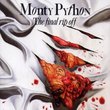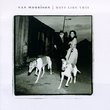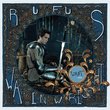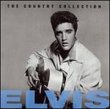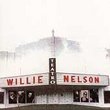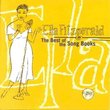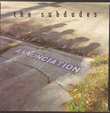| All Artists: Aribert Reimann, Gerd Albrecht, Bayerisches Staatsorchester, Gerhard Auer, Dietrich Fischer-Dieskau, Julia Varady, Rolf Boysen, Helga Dernesch, Colette Lorand Title: Reimann: Lear Members Wishing: 1 Total Copies: 0 Label: Deutsche Grammophon Original Release Date: 1/1/1978 Re-Release Date: 7/18/2000 Album Type: Original recording remastered Genre: Classical Style: Opera & Classical Vocal Number of Discs: 2 SwapaCD Credits: 2 UPC: 028946348024 |
Search - Aribert Reimann, Gerd Albrecht, Bayerisches Staatsorchester :: Reimann: Lear
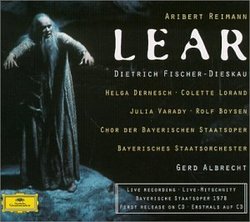 | Aribert Reimann, Gerd Albrecht, Bayerisches Staatsorchester Reimann: Lear Genre: Classical
If you tend to avoid contemporary music on the argument that much of it seems dark, pessimistic, and discordant, then on the face of it there might seem plenty of reason to steer clear of this work by German composer Aribe... more » |
Larger Image |
CD DetailsSynopsis
Amazon.com If you tend to avoid contemporary music on the argument that much of it seems dark, pessimistic, and discordant, then on the face of it there might seem plenty of reason to steer clear of this work by German composer Aribert Reimann. But think again. The darkness and pessimism that seize Reimann's legendary masterpiece from the very outset so compellingly match the mood of Shakespeare's haunting drama that it's almost impossible not to find yourself drawn into the tale afresh. Yes, the tortured strings, battering brass, cascading percussion, and anguished vocal lines make it a tough listen, but as with any new operatic adventure, paying close attention to the libretto focuses the mind and schools the ear.And there could be no better introduction to Lear than this--vividly recorded, culled from live performances at the National Theatre in Munich in the year of the opera's premiere there, 1978. Dietrich Fischer-Dieskau (who prompted Reimann to take on the project) is predictably magnificent in the title role, master of every nuance, but his is just one of a string of outstanding vocal contributions, from Rolf Boysen's remarkable Fool to Julia Varady's passionate Cordelia. Try this--but maybe not alone and late at night. --Andrew Green Similarly Requested CDs
|
CD ReviewsSimply another Germanic masterwork of dramaturgy. scarecrow | Chicago, Illinois United States | 07/23/2000 (5 out of 5 stars) "Shakepeare's various dramas has never lended itself to the cloistered predictable world of opera. Many Opera Masters have tried and failed. Giuseppe Verdi tried his hand at "Lear", but he cut so much that his imagination left nothing with any resemblance to the Elizabethan master.Subsequently his Othello barely resembles the original. Only Benjamin Britten's "Midsummer Nights Dream" has been the only relatively successful adaptation. And that was cut to hell,with Acts eclipsing themselves. Shakepeare's voice is like a volcanic eruption of language,incredibly complex with "spider-webs" of poetic,cultural and narrative cross-referencing In contrast Opera's text(libretti) are usually simpleminded affairs. Libretti are simply vehicles for the voice only,for direct engaged singing. The level of it's contextual complexity should remain limited for that fact that this direct emotion becomes compromised with excessive poetic maessage. Hofmanstahl with Strauss tested the limits of this context by suggesting more poetic imagery as a means of enriching libretti. His "Die Frau ohne Shatten" has marvelous poetry. Dietrich Fischer-Dieskau had commissioned this from Reimann his well known piano accompanist, for the former's Song Recitals for which he had written some art songs previously to cement this creative union. Reimann's musical language is indeed engaging and sits profoundly in the Germanic orchestral and operatic tradition, from Berg, Hartmann, Zimmermann,Lachenmann an expressionist language filled with forbidding textures, deep pallettes of extended sonorities,long overwrought phrases of gutrenching graphic-like music,you can smell its blood. The characterizations are expressionists as well. Reimann had the courage to make this tale his own not tripping on the same time-honored mistakes of previous opera composers.This tale of an old self-conceited man wanting the affection his repulsive two daughters Regan and Goneril(names resemble veneral diseases) in exchange for his formidable kingdom, his own.Asking "how much do you love me?" The singing of his two daughters follows a constructed tone row for each imparting a sense of predictable pitches, a means of concretizing the music. These daughters sound grotesque with a high degree of ornament equivalent to the obnoxious manipulative fakery and narrow minded sensibilities they are to represent. Cordelia, the other Lear daughter is more honest,more straightforward. Lear himself portrayed by Fischer-Dieskau's light penetrating baritone is well suited. Although perhaps a basso profundo would have imparted more the age of this ancient remnant of the medieval world of roughly hewn animal coats with standing armies ready to kill gamesmanship or for bad language. The San Francisco Opera had mounted this successfully,more with an Asian ambience,well Kurosawa's ferociously violent "Ran" is also a high level depiction of this sad tale. Still I'd place this opera after Zimmermann's "Die Soldaten",or one of Karl Amadeus Hartmann's latter "Symphonies" for the sheer amount of contextual complexity,musical texture,construction and deep dramaturgy. It is not the kind of easy breeze easy opera, the post-modern world usually encourages,so stay awa! if you are a Philip Glass-ite aficionado,where you refuse to tax yourlistening habits.(I'm sorry perhaps there is more to Glass than meets the ear!) Here "Lear" demands much focused listening, draining your listening constitution in music and drama." Magnificent performance of an intriguing opera Vincent Lau | 08/03/2000 (5 out of 5 stars) "Although this reviewer is not averse to modern operas, Aribert Reimann's LEAR will probably never be too close to his heart. Part of the reason perhaps lies in this reviewer's inability to appreciate music that are too percussive (it is overwhelmingly so in this opera, and in particular during Part One where the monotonous and repetitive clamour can become rather tiresome after a while). But more importantly, there seems to be a paucity of themetic material which can readily be discerned by the listener. While it is perhaps not fair to describe the music here as tantamount to the sound effects in radio plays (as mentioned by Fischer-Dieskau in his vigorous defence of the opera in the CD booklet), and that there exists certain tender moments to counter-balance the hugely brassy and percussive writing, one does feel a bit musically short-changed after listening to the complete opera, which lasts for over 2 hours.Nevertheless, Reimann generally did a better job with the vocal parts, which are powerfully written (and difficult to sing) and these have helped in enhancing the dramatic impact of the work as well as delineating the various characters involved in the morbid tragedy. As in all operatic adaptations of Shakespeare's plays, the story is invariably simplified and some of the minor characters are cut out. Nevertheless, the adaptation is generally a convincing one and the story unfolds naturally at a sure pace with considerable dramatic build-up from time to time. The chief glory of this live recording from Munich in 1978 lies in the magnificent performance of the entire cast. Dietrich Fischer-Dieskau, in excellent voice and at the height of his dramatic and interpretative powers, gives a shattering portrayal of the betrayed monarch. The sense of helplessness and loneliness of a king driven mad by his cruel daughters are heart-rendingly and delicately expressed. This recording will always serve as an excellent reminder of the great artistry of this legendary singer. Helga Dernesh, her Wagnerian voice gleaming and rock steady, gives a magisterial performance as the scheming Goneril, while Colette Lorand, grandly pompous though a bit shrill at time in some of Regan's coloratura outbursts, is perfectly in character. On the other hand, the good Cordelia is sung with great sensitivity by Julia Varady, and she is particularly fine in the moving duet with her father in Part Two. The men are also uniformly outstanding, with Hans Gunter Nocker's sonorous Gloucester, David Knutson's finely sung Edmund (with lots of difficult falsetto singing in the scenes which he feigns madness) , Werner Gotz's darkly treacherous Edmund and Rolf Boysen's sarcastic Fool providing a formidable counter-weight to the more flamboyant female roles. The orchestra and chorus at the Bayerischer Staatsoper provide excellent support under the baton of Gerd Albrecht.Despite the fact that this is a live recording, the sound quality is fine (with the voices very clearly and forwardly captured). And other than the article by Fischer-Dieskau mentioned earlier on, there is also a chronology of the process of composition penned by Reimann himself in the booklet, which may be of considerable interest to students who study composition. All in all, despite whatever reservations as regards the music, given the lofty standards achieved in the performance, this set can still be recommended with great enthusiasm." I SAW IT LIVE Raleigh W. Elliott | Anchorage, AK USA | 02/09/2001 (5 out of 5 stars) "I saw the premiere of this opera in San Francisco, and, to put it mildly, I was almost blown out of my chair. It's spellbinding. Definitely not for lovers of easy-listening music or for those addicted to melody. And I'm happy to report that this recording captures everything in the live performance except for the visuals. Nothing in theater approaches the madness and raw heart-rending intensity of Reimann's LEAR. Although I find most contemporary music irritatingly ambiguous or abstract, I had to embrace this opera. It surpasses categorization. The music will grab your attention like acid thrown in your face. Ugly and beautiful at the same time, it's so faithful to Shakespeare's play in mood and affect that you would swear the bard himself had written the score. LEAR is not just another contemporary opera: time will prove that it is one of the greatest operas of all time. Don't put it on until you have a couple of hours alone with your stereo, and be sure to take your phone off the hook. What Verdi struggled for years to do, then abandoned, defeated, Aribert Reimann has done."
|

 Track Listings (14) - Disc #1
Track Listings (14) - Disc #1